Related Research Articles
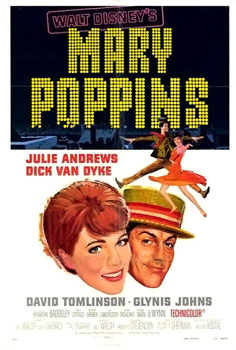
Mary Poppins is a 1964 American musical fantasy comedy film directed by Robert Stevenson and produced by Walt Disney, with songs written and composed by the Sherman Brothers. The screenplay is by Bill Walsh and Don DaGradi, based on P. L. Travers's book series Mary Poppins. The film, which combines live-action and animation, stars Julie Andrews in her feature film debut as Mary Poppins, who visits a dysfunctional family in London and employs her unique brand of lifestyle to improve the family's dynamic. Dick Van Dyke, David Tomlinson, and Glynis Johns are featured in supporting roles. The film was shot entirely at the Walt Disney Studios in Burbank, California, using painted London background scenes.
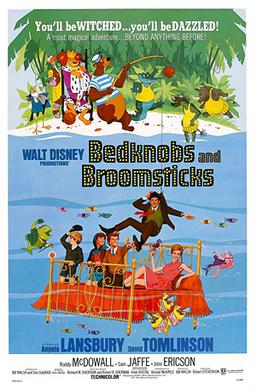
Bedknobs and Broomsticks is a 1971 American musical fantasy film directed by Robert Stevenson and songs written by the Sherman Brothers. It was produced by Bill Walsh for Walt Disney Productions. It is based upon the books The Magic Bedknob (1943) and Bonfires and Broomsticks (1947) by English children's author Mary Norton. The film, which combines live action and animation, stars Angela Lansbury, David Tomlinson, Ian Weighill, Cindy O'Callaghan, and Roy Snart.
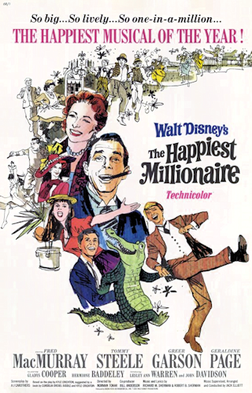
The Happiest Millionaire is a 1967 American musical film starring Fred MacMurray, based upon the true story of Philadelphia millionaire Anthony Drexel Biddle. The film, featuring music by the Sherman Brothers, was nominated for an Academy Award for Best Costume Design by Bill Thomas. The screenplay by A. J. Carothers was adapted from the play, based on the book My Philadelphia Father by Cordelia Drexel Biddle. Walt Disney acquired the rights to the play in the early 1960s. The film was the last live-action musical film to be produced by Disney before his death on December 15, 1966.

The Sherman Brothers were an American songwriting duo that specialized in musical films, made up of brothers Robert B. Sherman and Richard M. Sherman. Together they received various accolades including two Academy Awards and three Grammy Awards. They received nominations for a Laurence Olivier Award, a BAFTA Award, and five Golden Globe Awards. In 1976, they received a star on the Hollywood Walk of Fame, and the National Medal of the Arts in 2008.

"Supercalifragilisticexpialidocious" is a song and single from the 1964 Disney musical film Mary Poppins. It was written by the Sherman Brothers, and sung by Julie Andrews and Dick Van Dyke. It also appears in the 2004 stage show version. Because Mary Poppins was a period piece set in 1910, songs that sounded similar to songs of the period were wanted. The movie version finished at #36 in AFI's 100 Years...100 Songs survey of top tunes in American cinema.

Richard Morton Sherman is an American songwriter who specialized in musical films with his brother Robert B. Sherman. According to the official Walt Disney Company website and independent fact checkers, "the Sherman Brothers were responsible for more motion picture musical song scores than any other songwriting team in film history."

Robert Bernard Sherman was an American songwriter, best known for his work in musical films with his brother, Richard M. Sherman. The Sherman brothers produced more motion picture song scores than any other songwriting team in film history. Some of their songs were incorporated into live action and animation musical films including Mary Poppins, The Happiest Millionaire, The The Sword in the Stone, The Jungle Book, The Many Adventures of Winnie the Pooh, Chitty Chitty Bang Bang, The Slipper and the Rose, and Charlotte's Web. Their best-known work is "It's a Small World " possibly the most-performed song in history.
"Me Ol' Bamboo" is a song written by the Sherman Brothers for the motion picture Chitty Chitty Bang Bang. It was originally written to be choreographed as a morris dance for the film by Marc Breaux and Dee Dee Wood and adapted for the stage by choreographer Gillian Lynne who also created the choreography for Cats and The Phantom of the Opera.

Disney Sing-Along Songs is a series of videos on VHS, betamax, laserdisc, and DVD with musical moments from various Disney films, TV shows, and attractions. Lyrics for the songs are sometimes displayed on-screen with the Mickey Mouse icon as a "bouncing ball". Early releases open with a theme song introduction containing footage featuring Professor Owl and his class, seen originally in 1953 in two Disney shorts, Melody and Toot, Whistle, Plunk, and Boom. Professor Owl hosts some of the videos, while either Jiminy Cricket or Ludwig Von Drake host others. Later volumes, as well as the two Christmas videos, do not feature a host at all. Scenes with Jiminy Cricket and Ludwig Von Drake were taken from television programs, including the Walt Disney anthology television series and The Mickey Mouse Club, which featured the characters in the 1950s and 1960s.
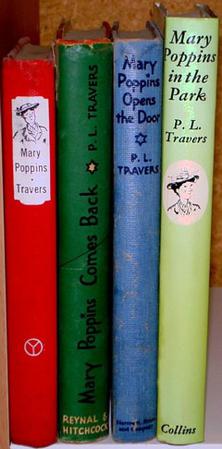
Mary Poppins is a series of eight children's books written by Australian-British writer P. L. Travers and published over the period 1934 to 1988. Mary Shepard was the illustrator throughout the series.
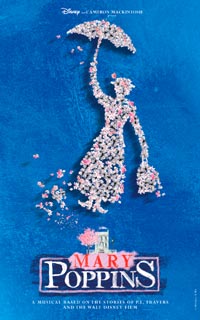
Mary Poppins is a musical with music and lyrics by Richard M. Sherman and Robert B. Sherman and additional music and lyrics by George Stiles and Anthony Drewe, and a book by Julian Fellowes. The musical is based on the similarly titled Mary Poppins children's books by P. L. Travers and the 1964 Disney film, and is a fusion of various elements from the two, including songs from the film.

The One and Only, Genuine, Original Family Band is a 1968 American comedy musical western film from Walt Disney Productions. Distributed by Buena Vista Distribution, the film is based on a biography by Laura Bower Van Nuys, directed by Michael O'Herlihy, with original music and lyrics by the Sherman Brothers. Set against the backdrop of the 1888 presidential election, the film portrays the musically talented Bower family, American pioneers who settle in the Dakota Territory. The film stars Walter Brennan, Buddy Ebsen, Lesley Ann Warren, John Davidson, and marks the film debut of Goldie Hawn.

Classic Disney: 60 Years of Musical Magic is a five-volume compilation series, each containing 25 songs compiled from Disneyland and Walt Disney World, various Disney films in animation and live-action, and the Walt Disney anthology television series. Each volume was released individually on CD and cassette between 1995 and 1998. Volume I was released on March 28, 1995, Volume II on September 12, 1995, Volume III on July 2, 1996, Volume IV on July 15, 1997 and Volume V on September 22, 1998. In 2000, a box set was released containing volumes 1 - 3, followed by a box set containing volumes 1 - 4 in 2001, Finally, a box set containing all five volumes packaged in a slipcase was released by Walt Disney Records in Australia, Japan, North America and Europe in 2003.
Anthony John Walton was a British set and costume designer. He won three Tony Awards, an Academy Award, and a Emmy Award. He received three Tony Awards for Pippin (1973), House of Blue Leaves (1986), and Guys and Dolls (1992). For his work in movies, he won an Academy Award for Best Production Design, for All That Jazz (1979), and nominations for Mary Poppins (1964), Murder on the Orient Express (1974), and The Wiz (1978). For his work in television, he won an Primetime Emmy Award, for Death of a Salesman (1985).
"Feed the Birds" is a song written by the Sherman Brothers and featured in the 1964 motion picture Mary Poppins. The song speaks of an old beggar woman who sits on the steps of St Paul's Cathedral, selling bags of breadcrumbs to passers-by for two pence a bag so that they can feed the many pigeons which surround her. The scene is reminiscent of the real-life seed vendors of Trafalgar Square who began selling birdseed to passers-by shortly after its public opening in 1844.
"Chim Chim Cher-ee" is a song from Mary Poppins, the 1964 musical film, and is also featured in the 2004 Mary Poppins musical.

"A Spoonful of Sugar" is a song from Walt Disney's 1964 film and 2004 musical version of Mary Poppins, composed by Robert B. Sherman and Richard M. Sherman. The song has characteristics of the fast-paced one-step, a popular dance in the 1910s.
"Step in Time" is a song and dance number from Walt Disney's 1964 film Mary Poppins which was composed by the Sherman Brothers. The choreography for this song was provided by Marc Breaux and Dee Dee Wood. It is sung by Bert, the chimney sweep and the other chimney sweeps on the rooftops of London. It is similar to the old British music hall song "Knees Up Mother Brown".

Saving Mr. Banks is a 2013 biographical drama film directed by John Lee Hancock from a screenplay written by Kelly Marcel and Sue Smith. Centered on the development of the 1964 film Mary Poppins, the film stars Emma Thompson as author P. L. Travers and Tom Hanks as film producer Walt Disney, with supporting performances by Paul Giamatti, Jason Schwartzman, Bradley Whitford, Colin Farrell, Ruth Wilson, and B. J. Novak. Deriving its title from the father in Travers's story, Saving Mr. Banks depicts the author's tragic childhood in rural Queensland in 1906 and the two weeks of meetings during 1961 in Los Angeles, during which Disney attempts to obtain the film rights to her novels.

Mary Poppins: Original Cast Soundtrack is the soundtrack album of the 1964 film Mary Poppins, with music and lyrics written by songwriters Richard M. Sherman and Robert B. Sherman, and adapted and conducted by Irwin Kostal.
References
- 1 2 "The real history of 'Knees up Mother Brown'". Roman Road London. 25 August 2020.
- ↑ James Hilton (1941) Random Harvest
- ↑ Michael Kilgariff (1998) Sing Us One of the Old Songs: A Guide to Popular Song 1860-1920
- ↑ International Lyrics Playground: "Knees Up Mother Brown," Traditional Party Song
- ↑ "Knees up Mother Brown - West Ham United FC Online: FAQ". Kumb.com.
- ↑ Musical Reunion with Dick van Dyke and Julie Andrews, Mary Poppins 45th Anniversary Special Edition, Disney DVD